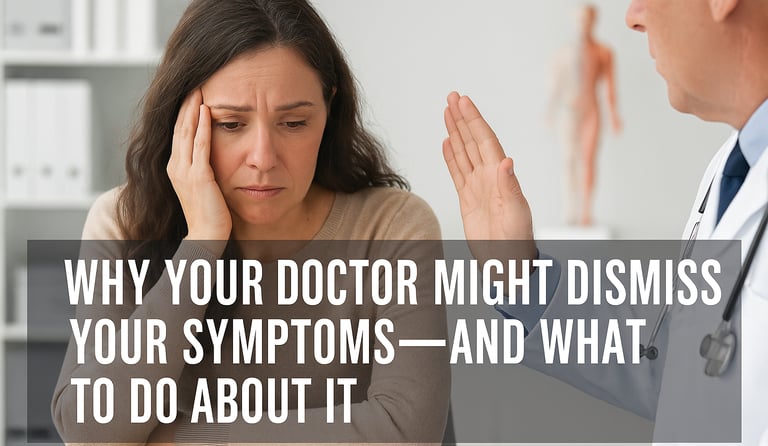Why Your Doctor Might Dismiss Your Symptoms—and What to Do About It
DIAGNOSISMEDICAL GASLIGHTINGSELF-EMPOWERMENTBEGINNER BLOG
6/22/20253 min read


If you live with hypermobility and a variety of symptoms in numerous systems of the body, there’s a good chance you’ve heard some version of:
“Your labs are normal.”
“It’s just anxiety.”
“You’re too young to be in this much pain.”
“Maybe you should try exercise and social interactions.”
These comments are more than frustrating—they're invalidating and disorienting. You know something is wrong, but the people you're supposed to trust for answers may dismiss your symptoms outright.
You're not imagining things. And you're not alone.
🩺 Why Doctors Often Dismiss Hypermobility-Related Symptoms
This dismissal usually doesn’t come from malice—it comes from medical blind spots. Here are the most common reasons:
1. They Weren’t Taught About hEDS or HSD
Medical schools do not teach about connective tissue disorders in detail. If hEDS is mentioned at all, it's often presented as rare and untreatable. Most doctors have never learned how to recognize or support a hypermobile patient.
2. Your Symptoms Don’t Fit Standard Patterns
Hypermobility can cause dozens of seemingly unrelated symptoms—from digestive issues to anxiety, fatigue, joint pain, dizziness, and more. And since every hypermobile patient will have a different combination of symptoms from every other hypermobile patient, it is challenging for doctors to recognize a pattern that leads to a diagnosis. Doctors trained in siloed specialties may see only pieces of the puzzle and fail to connect them.
3. They Default to Psychologizing Complex Illness
When tests come back “normal,” and no clear-cut answers emerge, many providers assume your symptoms are “in your head.” This is especially common if you're female, young, or attractive, as so many hypermobile patients are.
💡 Understanding What’s Really Happening in Your Body
The truth is, your symptoms do make sense—just not in the traditional medical model.
hEDS and HSD affect your entire connective tissue system, which touches every part of the body. That’s why your symptoms may seem unrelated but are actually interconnected:
Unexplained pain in the body and headaches? Connective tissue instability.
GI problems? Lax tissues in the digestive tract.
Dizziness? Dysautonomia, often connected to blood vessel elasticity.
Anxiety and fatigue? Nervous system overload due to chronic inflammation and proprioceptive confusion.
Your experiences are real. They are explainable. And they are treatable—just not in the way most doctors are trained to think.
🚧 So What Can You Do About It?
1. Stop Seeking All Your Validation from Medical Providers
This is tough, but freeing: Your lived experience is valid, whether or not a doctor understands it. When you internalize this, you stop trying to convince others and start advocating for yourself with strength and clarity.
2. Find the Right Kind of Support
Instead of chasing more dismissive specialists, look for:
Allied health professionals (PTs, OTs, NDs, nutritionists) with experience in hypermobility
Peer support from others with hEDS or HSD
Books, blogs, and courses created by people who get it
3. Get Informed—and Take Your Health Into Your Own Hands
That’s where Hypermobile and Happy comes in.
📘 Hypermobile and Happy Helps You Break the Cycle
This book is your toolkit for understanding your condition—and healing from it—without relying on doctors who don’t understand you.
Inside, you’ll learn:
What hypermobility really is and how it affects every system in the body
How to decode your symptoms and see the connections
Lists of science-backed treatments for specific hypermobility-related conditions
How to build a safe, affordable, holistic healing protocol
Tools that help you self-advocate with confidence
You don’t need permission to start healing. You just need the right information.
🧭 Final Thought: You Are Not Too Much
If your doctor has made you feel like you’re exaggerating, dramatic, or just “difficult”—please know this:
You are not too sensitive.
You are not a burden.
You are not broken.
You are living in a body that needs specific, informed care. And it’s okay if you have to look outside the medical system to get it.
You’re allowed to feel better, and I hope you'll start your healing journey today.
